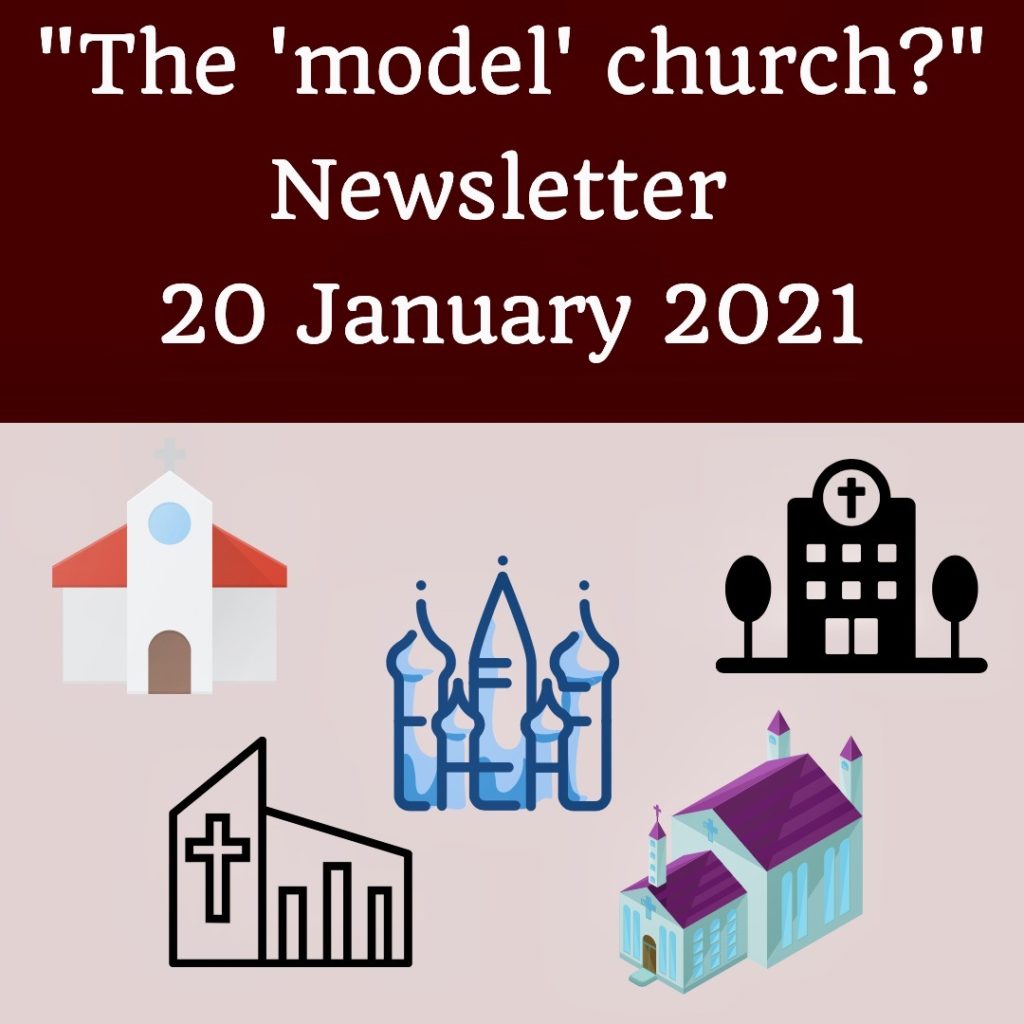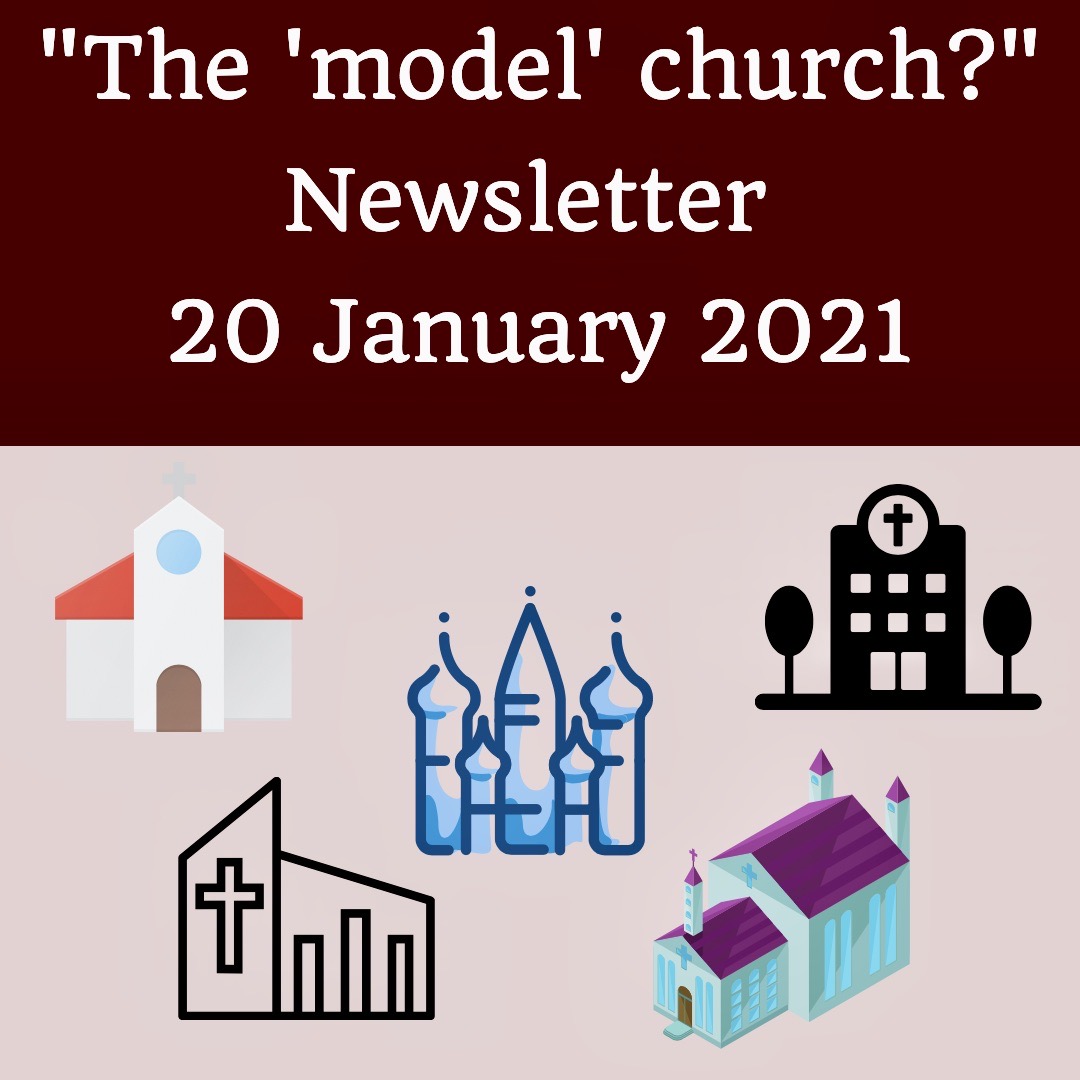Newsletter Episode 79, 22 January 2021

In this part of the newsletter I would ordinarily talk about something different from my broadcasting output. However, this week I was so taken by the topic of my “what we are reading” episode that I thought I would reproduce it. You can listen to the full recording on my YouTube channel or podcast feed and find the full text of the article on the website. However, for those of you that might not normally look at those, here is a shorter version.

I have been reading the book, ‘Character and virtue in theological education’, by Marvin Oxenham. One of the chapters contains a summary of what he describes as the five models of church commonly found today. As you read the following descriptions, ask yourself the following questions:
- Which best describes your current congregation?
- Which fits your preferences?
- Which accords most faithfully to the biblical record as you see it?
Let’s have a brief look at a description of each model.
1. Love God and neighbour
“In this kind of church, leaders express love in all its dimensions, ranging from pastoral care to the transformation of culture.” p87
““A new commandment I give to you, that you love one another, even as I have loved you, that you also love one another. “By this all men will know that you are My disciples, if you have love for one another.”” (John 13:34–35 NAS95)
It is hard to argue with the primary nature of this model. If this is how the world will know that we are truly the followers of Jesus, then why would we want to prioritise anything above love?
2. Liberating persons and societies from oppression
“This vision embraces moral and social reform and those in leadership serve as agents of change, freeing both individuals and collectives from bondage.” p87
“…the book of the prophet Isaiah was handed to Him. And He opened the book and found the place where it was written, “THE SPIRIT OF THE LORD IS UPON ME, BECAUSE HE ANOINTED ME TO PREACH THE GOSPEL TO THE POOR. HE HAS SENT ME TO PROCLAIM RELEASE TO THE CAPTIVES, AND RECOVERY OF SIGHT TO THE BLIND, TO SET FREE THOSE WHO ARE OPPRESSED, TO PROCLAIM THE FAVOURABLE YEAR OF THE LORD.” And He closed the book, gave it back to the attendant and sat down; and the eyes of all in the synagogue were fixed on Him. And He began to say to them, “Today this Scripture has been fulfilled in your hearing.”” (Luke 4:17–21 NAS95)
If this was the vision of Jesus for his ministry, should it not also be the vision for the contemporary church? It certainly sounds like good news, and was viewed that way on the day Jesus visited the synagogue.
3. Creating and sustaining Christian identity
“For this tradition, maintaining identity is considered an urgent and important task in the midst of a quickly changing, pluralistic and syncretistic world, and the role of the minister is to revive and redefine the distinctive identity of the church.” p88
“But you are A CHOSEN RACE, A royal PRIESTHOOD, A HOLY NATION, A PEOPLE FOR God’s OWN POSSESSION, so that you may proclaim the excellencies of Him who has called you out of darkness into His marvellous light; for you once were NOT A PEOPLE, but now you are THE PEOPLE OF GOD; you had NOT RECEIVED MERCY, but now you have RECEIVED MERCY.” (1 Peter 2:9–10 NAS95)
If we do not know who we are, we cannot know our mission. If we do not protect and purify our identity, we cannot be distinctive in this world.
4. Pursuit of an evangelical mission
“Here, the church is mostly seen as an agent of salvation that rescues the world from sin through the gospel and builds the personal lives of believers according to biblical discipleship patterns.” p88
““All authority has been given to Me in heaven and on earth. “Go therefore and make disciples of all the nations, baptising them in the name of the Father and the Son and the Holy Spirit, teaching them to observe all that I commanded you; and lo, I am with you always, even to the end of the age.”” (Matthew 28:18–20 NAS95)
Disciple-making is the activity towards which all other functions in the church are subservient. What is the point of all the other things a church can do, if people are not becoming Christians?
5. Pastoral care
“In this model, the purpose of the church is to help people find their spiritual and mental health. It is, in a way, a vocation to human fullness.” p88
“I came that they may have life, and have it abundantly.” (John 10:10 NAS95)
Surely Jesus does not want us simply to be saved, but to grow into all we can be as a child of God. Our connection with God needs healing, but so does much more than that. If we are to be the Church of Christ on Earth, we must become a model of what is possible with the Spirit of Christ healing us from within.
Conclusion
If we do not examine our own local model we may unwittingly omit some aspects of church life dear to the heart of God.
Your thoughts, please.
The week ahead
If you’d like to pray for me I’d be very grateful. Here are some of my plans:
- The next Tuesday teaching tip class in the series, “The heart of communication”, “Notes or no notes?”
- The next “What we are reading episode”
- The next few daily quiet time coaching episodes on Abraham
- The Sunday sermon for the Watford church in the Abraham series: “Adventures in faith with Abraham”. This week – Genesis 16. Impatience, faulty listening, glorious seeing.
- The next gathering of the Apollos group on Saturday.
Until the next time,
God bless, Malcolm
